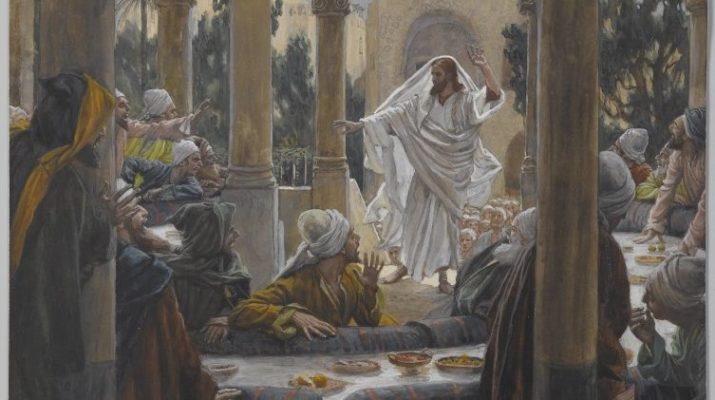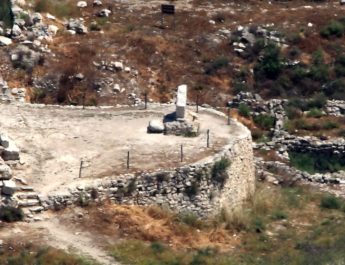Matthew 21:33-46
Ordinary A45
33 “ListenA to anotherB parable.C
A “listen” = akouo. This is hear or listen, but it also means to understand by hearing. This is where the word “acoustics” comes from.
B “another” = allos. This is other, another. Specifically, it is another of a similar kind or type. There is a different word in Greek that speaks of another as a different kind (heteros).
C “parable” = parabole. From paraballo (literally to throw beside, compare, arrive, liken); {from para (by, beside, in the presence of) + ballo (to throw, cast, place, put, drop)}. This is a parable, comparison, adage. Quite often a tale told or a metaphor to establish a point, but it could be a true story.
There was aD landownerE who plantedF a vineyard,G
D {untranslated} = anthropos. Probably from aner (man, male, husband) + ops (eye, face). This is human, humankind. Used for all genders.
E “landowner” = oikodespotes. 12x in NT. From oikos (house – the building, the household, the family, descendants; the temple) + despotes (lord, master, despot; authority who has unrestricted power and jurisdiction) + posis (husband). This is the master of the house, head of a family, or the householder.
F “planted” = phuteuo. 11x in NT. From phuton (a plant) OR from the base of phuo (to grow, produce, spring up; perhaps from the sense of puff or blow – to swell up; hence, to germinate; to grow literally or figuratively). This is plant or implant. Figuratively, this word is used for Christian teaching.
G “vineyard” = ampelon. From ampelos (vine or grapevine as that which coils around); perhaps from the base of amphoteros (both, all); {from amphi (around) + halon (the threshing floor where grain is rolled to separate from the chaff); {from halos (threshing floor); probably from helisso (to roll up, coil, wrap)}}. This is vineyard. Figuratively, it can be the religious life of the people of Israel or the body of Christ.
put a fenceH aroundI it, dugJ a wine pressK in it, and builtL a watchtower.M
H “fence” = phragmos. 4x in NT. From phrasso (to stop, fence in, obstruct); perhaps from phren (diaphragm, heart, intellect, understanding; figurative for personal opinion or inner mindset; thought regulating action; sympathy, feelings, cognition); perhaps from phrao (to rein in or curb). This is a fence, barrier, wall, or hedge. It is a fence literally or figuratively.
I “put…around” = peritithemi. 8x in NT. From peri (about, concerning, all around, encompassing) + tithemi (to put, place, set, fix, establish in a literal or figurative sense; properly, this is placing something in a passive or horizontal position). This is to place around i.e. to clothe. Figuratively, it can mean to bestow or to present.
J “dug” = orusso. 3x in NT. This is to dig, burrow, or excavate.
K “wine press” = lenos. 5x in NT. This can refer to the vat where one stomps the grapes or the vat below that were the new wine flows out of the press.
L “built” = oikodomeo. Related to “landowner” in v33. From oikos (see note E above) + domeo (to build). This is to build a house or be a house builder. Figuratively, it can mean to edify or encourage, be strong or embolden.
M “watchtower” = purgos. 4x in NT. This is a tower or other kind of structure that is fortified.
Then he leasedN it to tenantsO and went to another country.P
N “leased” = ekdidomi. 4x in NT – all in the Parable of the Wicked Tenants in the synoptic gospels. From ek (from, from out of) + didomi (give, offer, place, bestow, deliver; give in a literal or figurative sense). This is to give up or out. It can also be to lease or rent.
O “tenants” = georgos. 19x in NT. From ge (earth, land, soil, region, country, the inhabitants of an area) + ergon (word, task, action, employment); {from ergo (to work, accomplish) or from erdo (to do)}. This is wine-dresser, farmer, someone who works the land. It is also where the name “George” comes from.
P “went to another country” = apodemeo. 6x in NT. From apodemos (to go abroad, sojourn in a foreign country); {from apo (from, away from) + demos (district, multitude, rabble, assembly; Greeks bound by similar laws or customs); {from deo (to tie, bind, compel, declare unlawful)}}. This is to travel abroad, be away from home. This word shares a root with “democracy” and “Nicodemus.”
34 When the harvestQ timeR had come,S he sentT his slavesU to the tenants to collectV his produce.W
Q “harvest” = karpos. Perhaps from harpazo (to seize by force, snatch away); from haireo (to choose, take). This is a fruit or vegetable, through sometimes it refers to an animal. Figuratively, it is deeds, results, profits, or gain.
R “time” = kairos. This is season, opportunity, occasion. The word chronos is used for chronological time. Kairos is used for spiritually significant time – the right time or appointed time.
S “come” = eggizo. From eggus (nearby or near in time). This is extremely close by – approaching, at hand, immediately imminent.
T “sent” = apostello. From apo (from, away from) + stello (to send, set, arrange, prepare, gather up); {probably from histemi (to make to stand, stand, place, set up, establish, appoint, stand firm, be steadfast)}. This is to send forth, send away, dismiss, send as a messenger. It implies one that is sent for a particular mission or purpose rather than a quick errand. This is where “apostle” comes from.
U “slaves” = doulos. Related to “went to another country” in v33. Perhaps from deo (see note P above). This is used for a servant or for a slave, enslaved. It refers to someone who belongs to someone else. But, it could be voluntary (choosing to be enslaved to pay off debt) or involuntary (captured in war and enslaved). It is used as a metaphor for serving Christ. Slavery was not inherited (i.e. the children of slaves were not assumed to be slaves) and slaves could buy their way to freedom. Slavery was generally on a contractual basis (that is for the duration of how long it took you to pay your debt and/or save up enough money to buy your freedom).
V “collect” = lambano. It does not refer to passive receiving of something, but active acceptance or taking of something whether it is offered or simply nearby. It focuses on individual decision and action.
W “produce” = karpos. Same as “harvest” in v34. See note Q above.
35 But the tenants seizedX his slaves andY beatZ one, killedAA another, and stonedBB another. 36 Again he sent other slaves, more than the first; and they treated them in the same way.
37 Finally he sent his son to them, saying, ‘They will respectCC my son.’
X “seized” = lambano. Same as “collect” in v34. See note V above.
Y {untranslated} = men. This is truly, indeed, even, in fact. Often, it is not translated, but used to emphasize affirmation.
Z “beat” = dero. 15x in NT. To whip, flog, scourge, beat, thrash.
AA “killed” = apokteino. From apo (from, away from) + kteino (to kill). To put to death, kill, slay. Figuratively, this word can mean abolish, destroy, or extinguish.
BB “stoned” = lithoboleo. Related to “parable” in v33. 7x in NT. From lithos (stone literal or figurative; used for Jesus as the cornerstone) + ballo (see note C above). This is to stone i.e. throw stones at to kill.
CC “respect” = entrepo. 9x in NT. From en (in, on, at, by, with) + trepo (to turn; may imply turn with change). This is to turn. It could be to turn to pay rapt attention to, to turn in shame, recoil, or to turn to in respect.
38 But when the tenants sawDD the son, they said to themselves, ‘This is the heir;EE come,FF let us kill him and get his inheritance.’GG 39 So they seized him, threwHH him out of the vineyard, and killed him. 40 Now when the ownerII of the vineyard comes, what will he do to those tenants?”
DD “saw” = horao. To see, perceive, attend to, look upon, experience. Properly, to stare at and so implying clear discernment. This, by extension, would indicate attending to what was seen and learned. This is to see, often with a metaphorical sense. Can include inward spiritual seeing.
EE “heir” = kleronomos. 15x in NT. From kleros (lot, portion, heritage; that share assigned to you; also a lot used to determine something by fate, chance, or divine will); {perhaps from klero (casting a lot) or from klao (to break in pieces as one breaks bread)} + the same as nomos (what is assigned – usage, law, custom, principle; used for the law in general or of God’s law; sometimes used to refer to the first five books of the Bible or the entire Old Testament; also used to refer to theology or the practice and tradition of interpreting and implementing the law of God); {from nemo (to parcel out, assign)}}. This is heir, inheritor, or possessor – whether literal of figurative.
FF “come” = deute. 12x in NT. From deuro (come here, hither, hence, now, until now). This is come, follow – as an exclamatory mood.
GG “inheritance” = kleronomia. Related to “heir” in v38. 14x in NT. From kleronomos (see note EE above). This is inheritance, heritage, or possession.
HH “threw” = ekballo. Related to “parable” in v33 & “stoned” in v35. This is to throw, put out, produce, expel, banish. It is eject in a literal or figurative sense.
II “owner” = kurios. From kuros (authority, supremacy). This is a respectful address meaning master or sir. It refers to one who has control or power greater than one’s own. So, it was also applied to God and Jesus as Master or Lord.
41 They said to him, “He will put those wretchesJJ to a miserableKK death,LL and lease the vineyard to other tenants who will giveMM him the produce at the harvest time.”
JJ “wretches” = kakos. This is bad, evil, harm, ill. It is evil that is part of someone’s core character – intrinsic, rotted, worthless, depraved, causing harm. It refers to deep inner malice that comes from a rotten character. Can be contrasted with the Greek poneros, which is that which bears pain – a focus on the miseries and pains that come with evil. Also contrasting the Greek sapros, which deals with falling away from a previously embodied virtue.
KK “miserable” = kakos. Related to “wretches” in v41. 16x in v41. From kakos (see note JJ above). This is wrongly, badly, cruelly, with bad motives, misery connected to affliction. It can be physically badly or morally badly, i.e. evilly.
LL “death” = apollumi. From apo (from, away from) + ollumi (to destroy or ruin; the loss that comes from a major ruination). This is to destroy, cut off, to perish – perhaps violently. It can also mean to cancel or remove.
MM “give” = apodidomi. Related to “leased” in v33. From apo (from, away from) + didomi (see note N above). This is to give back, return, give away. It is to restore as when one makes payment – to rend what is due, to sell.
42 JesusNN said to them, “Have you never readOO in the scriptures:PP
NN “Jesus” = iesous. From Hebrew Yehoshua (Joshua, the Lord is salvation); {from YHVH (proper name of the God of Israel; the self-existent and eternal one); {from havah (to become) or from hayah (to come to pass, become, be)} + yasha (to deliver, defend, help, preserve, rescue; properly, to be open, wide or free, which implies being safe. So, in a causative sense, this is to free someone). This is Jesus or Joshua in Greek – the Lord saves or the Lord is salvation.
OO “read” = anaginosko. From ana (upwards, up, again, back, anew) + ginosko (know, recognize, learn from firsthand experience). This is literally to know again – to recognize, read, or discern.
PP “scriptures” = graphe. From grapho (to write). This is literally writing, a document. In the New Testament, this is always used for scripture.
‘The stoneQQ that the builders rejectedRR
has become the cornerstone;SS
this was the Lord’sTT doing,
and it is amazingUU in our eyes’?VV
QQ “stone” = lithos. Related to “stoned” in v35. See note BB above.
RR “rejected” = apodokimazo. 9x in NT. From apo (from, away from) + dokimazo (to test, examine, prove; to approve after subjecting to a test to determine if it is real or acceptable; to test in a literal or figurative sense); {from dokimos (what passes the test, approved, acceptable, genuine, verified); from dechomai (to warmly receive, be ready for what is offered, take, accept, or welcome; to receive in a literal or figurative sense) or dokeo (to have an opinion, seem, appear, suppose; a personal judgment; to think); {from dokos (opinion)}}. This is rejected or disqualified following a test. It is rejected after rigorous investigation and so seen as useless or unworthy.
SS “cornerstone” = kephale + gonia. Literally “head corner.” Kephale is head or chief. It can be a literal head or, figuratively, a ruler or lord. It can also refer to a corner stone. This is where the word “cephalic” comes from. Gonia is 9x in NT. From gonu (knee, foot). This is corner, angle, or secret place.
TT “Lord’s” = kurios. Same as “owner” in v40. See note II above.
UU “amazing” = thaumastos. 6x in NT. From thaumazo (to marvel, wonder, or admire; to be amazed out of one’s senses or be awestruck; being astonished and starting to contemplate what was beheld); from thauma (a wonder or marvel; used abstractly for wonderment or amazement; something that evokes emotional astonishment); may be from theaomai (to behold, look upon, see, contemplate, visit); from thaomai (to gaze at a spectacle; to look at or contemplate as a spectator; to interpret something in efforts to grasp its significance). This is wonderful, marvelous, awe-inspiring. It is something that moves one to deepest feelings.
VV “eyes” = ophthalmos. From optanomai (to appear, be seen by). This is eye or sight. It is used figuratively for the mind’s eye, a vision, or for envy.
43 Therefore I tell you, the kingdomWW of GodXX will be taken awayYY from you
WW “kingdom” = basileia. From basileus (king, emperor, sovereign); probably from basis (step, hence foot; a pace); from baino (to walk, to go). This is kingdom, rule, authority, sovereignty, royalty, a realm.
XX “God” = theos. From Proto-Indo-European origins, meaning do, put, place. This is God or a god in general.
YY “taken away” = airo. This is to lift up in a literal or figurative sense. So, it could mean to lift, carry, or raise. It could also imply lifting something in order to take it away or remove it. Figuratively, this can be used for raising the voice or level of suspense. It can mean sailing off as raising the anchor. It can also correspond to a Hebrew expression for atonement of sin (lift/remove sin).
and givenZZ to a peopleAAA that produces the fruitsBBB of the kingdom. 44 The one who falls on this stone will be broken to pieces;CCC and it will crushDDD anyone on whom it falls.”
ZZ “given” = didomi. Related to “leased” in v33 & “give” in v41. See note N above.
AAA “people” = ethnos. Probably from etho (a custom or culture). This is people who are united by having similar customs or culture. Generally, it is used to refer to Gentiles. This is a tribe, race, nation, or Gentiles in general. This is where the term “ethnicity” comes from.
BBB “fruits” = karpos. Same as “harvest” in v34. See note Q above.
CCC “broken to pieces” = sunthlao. 2x in NT – both in Parable of the Wicked Tenants in Matthew and Luke. From sun (with, together with) + thlao (to crush). This is to pulverize, crush, shatter, break in pieces.
DDD “crush” = likmao. 2x in NT– both in Parable of the Wicked Tenants in Matthew and Luke. From likmos (a winnowing fan). This is to grind into a powder, winnow, scatter.
45 When the chief priestsEEE and the PhariseesFFF heard his parables, they realizedGGG that he was speaking about them.
EEE “chief priests” = archiereus. From archo (to rule, begin, have first rank or have political power) + hiereus (a priest literal or figurative – of any faith); {from hieros (sacred, something sacred, temple, holy, set apart; something consecrated to God or a god)} This is a high or chief priest.
FFF “Pharisees” = pharisaios. From Aramaic peras (to divide, separate) and from Hebrew parash (to make distinct, separate, scatter). This is a Pharisee, a member of a Jewish sect active in the 1st century. Their name meant separate in the sense of wanting to live a life separated from sin. Whereas the Sadducees were part of the priestly line and inherited their religious position and responsibilities, Pharisees were regular people who studied the scriptures and offered guidance to regular folk. Sadducees were often wealthier and willing to sacrifice their identity to rub elbows with Roman society. Pharisees were often more concerned with what it meant to follow God without compromising what made them different as followers of God. Sadducees primarily believed in that which was written down (the first five books of the Bible) and Pharisees believed in the Bible and the traditions of the elders. Pharisees had a very wide range of interpretations and diversity of opinion. Their standard mode of religion engagement was lively debate with one another. To argue religion with another teacher was to recognize that they had something of value to offer.
GGG “realized” = ginosko. Related to “read” in v42. See note OO above.
46 They wantedHHH to arrestIII him, but they fearedJJJ the crowds, because they regarded him as a prophet.KKK
HHH “wanted” = zeteo. This is to seek, search for, desire. It is searching for something by inquiring or investigation. It can be seek in a literal or figurative sense. There is a Hebrew figure of speech “to seek God’s face” so it can also mean to worship God. Alternately, you could seek someone’s life i.e. plot to kill them.
III “arrest” = krateo. From kratos (strength, power, dominion; vigor in a literal or figurative sense; power that is exercised). This is being strong or mighty so, by extension, to prevail or rule. It can also mean to seize, grasp hold of and thereby control. In this sense, it means arrest.
JJJ “feared” = phobeo. From phobos (panic flight, fear, fear being caused, terror, alarm, that which causes fear, reverence, respect); from phebomai (to flee, withdraw, be put to flight). This is also to put to flight, terrify, frighten, dread, reverence, to withdraw or avoid. It is sometimes used in a positive sense to mean the fear of the Lord, echoing Old Testament language. More commonly, it is fear of following God’s path. This is where the word phobia comes from.
KKK “prophet” = prophetes. From pro (before, in front of, earlier than) + phemi (to declare, say, use contrasts in speaking to shed light on one point of view); {from phao (to shine) or phaino (to bring light, cause to appear, shine, become visible or clear)}. This is a prophet or poet – one who speaks with inspiration from God.
Image credit: “Curses against the Pharisees” by James Tissot, between 1886 and 1894.




